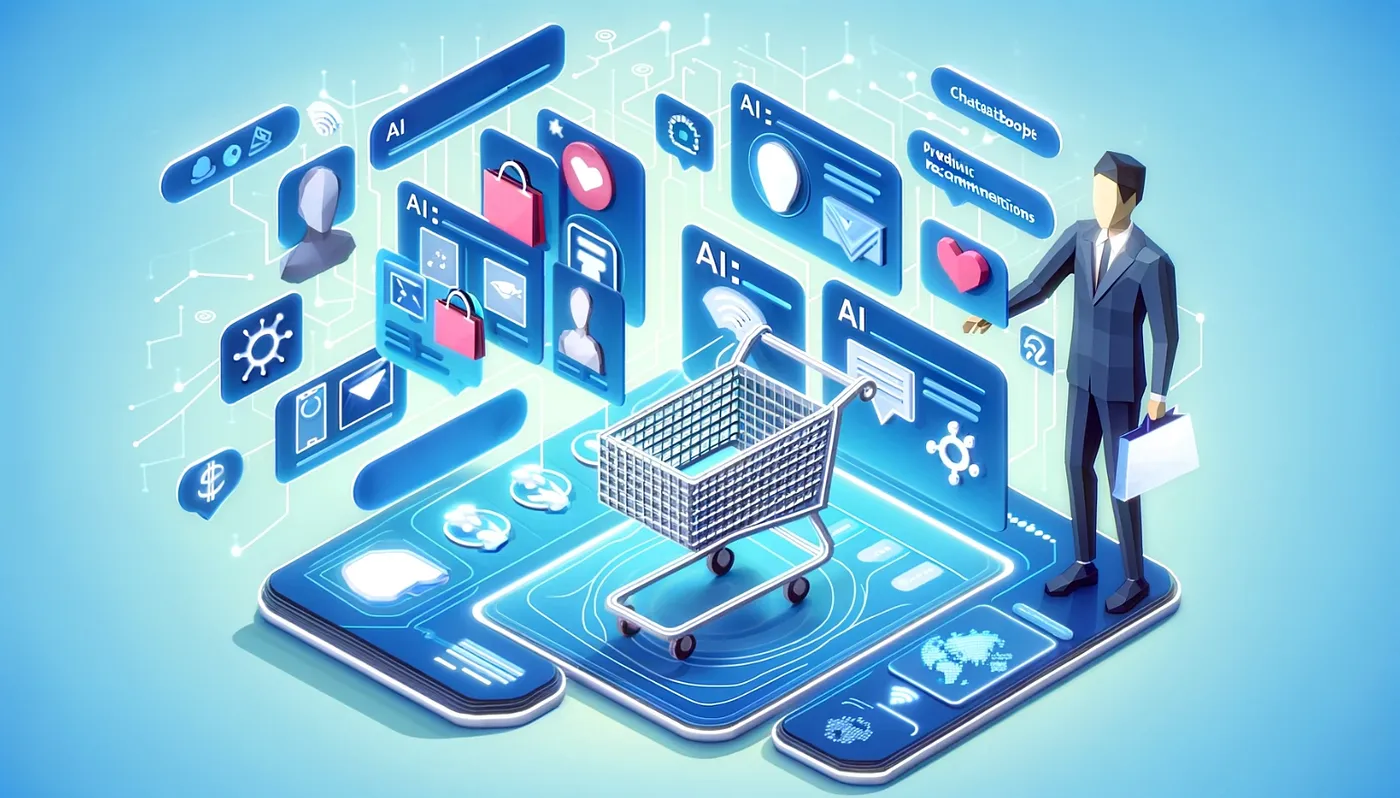E-commerce personalization through AI is quickly becoming the trend amongst e-commerce businesses that wish to offer their clients exceptional shopping experiences. The establishment of artificial intelligence is changing the way companies approach online buyers through AI-based product recommendations and information gathered by customer behavior analytics. With the assistance of AI, brands will be able to provide an individual shopping experience online through retail personalization, improve customer satisfaction, and boost conversion. AI-based personalization is no longer an option; be it a suggested product or improved marketing campaigns, it is the sole option to stay competitive in the constantly developing world of contemporary retail.
Why AI Tools for E-commerce Personalization Matter
Internet shopping has changed customer expectations. Consumers have become demanding in seeking smooth, personalised experiences which reflect the type of attention that they would have received at the physical store. E-commerce personalization AI tools also enable companies to duplicate that offline touch and even exceed it.
- They examine the history of browsing, purchase history, and engagement behavior.
- They make precise predictions of Customer preferences.
- They provide in-time suggestions that spur repeat buying.
This will make each buyer feel appreciated and result in increased brand loyalty. Finally, one personalized shopping experience does not end at convenience, but rather at the formation of long-term relationships with the customers.
Core Benefits of AI Tools for E-commerce Personalization
Enhanced Customer Engagement
Using AI-powered product recommendations, companies will be able to display what the visitors desire. This makes the users spend more time on websites and applications. Easy enticement is also likely to lead to impulse buying behavior.
Improved Conversion Rates
The target market can be reached easily when the products are made to accommodate the unique interests and needs of a customer. Research findings indicate that customized recommendations have the potential to boost conversion rates by 30%.
Higher Customer Retention
Individualization leads to a feeling of intimacy. The repeat customers do not only spend more but also help in growth in the long run. Online retail personalization allows using AI to monitor preferences and be relevant throughout the duration.
Data-Driven Decision Making
With customer behavior analysis, companies can understand their purchasing patterns. This enables retailers to change their pricing strategies, marketing strategies, and inventory strategies such that their products remain in tune with customer demand.
Read Also:- AI Tools for Video Generation
Key AI Tools for E-commerce Personalization
Recommendation Engines
The AI tools used in e-commerce personalization focus on their recommendation engines. They scroll through huge volumes of customer information to recommend products that will most closely fit the needs of a shopper.
- The recommendations are of the type:
- Associated goods (“shopping cart also purchased)
- Complementary goods (bought together)
- Recommendations depending on the browsing.
A good recommendation engine improves personalization of the shopping experience, whereby the customer does not miss products of interest.
Dynamic Search and Navigation
The use of AI-powered search tools assists in providing search results with high accuracy when queries are either vague or misspelled. As an example, when a customer enters such a query as blu jeans, AI still understands it as blue jeans and displays the correct results.
- The filtering options are also smart and make the browsing experience more refined.
- Predictive search saves the time taken by customers to search for what they require.
This provides a more improved experience and reduces drop-offs.
Chatbots and Virtual Assistants
- The AI-powered chatbots assist people whenever a shopper needs guidance on his or her path. They give answers, prescribe products, and guide on the purchase decision in real-time.
- Chatbots customize their chat depending on the previous interaction.
- They also make internet shopping interactive and interesting.
Personalized Email Campaigns
Individual emails are more open and converted. AI will be able to customize the subject lines, product recommendations, and discounts based on customer preferences by using customer behavior analytics.
- Recommendations: Cart abandonment emails containing product recommendations.
- Congratulations or birthday messages with special offers.
- Re-engagement exercises for idle customers.
These endeavors provide a very effective personalized shopping experience off the site.
Pricing Optimization Tools
AI-based dynamic pricing enables retailers to establish competitive prices without reducing their profitability. Such tools study the pricing of competitors, the variation of demand, and customer purchasing behavior in order to suggest the most effective pricing policies.
- Discounts may be customized for individual customers.
- There is a pricing on loyalty that maintains high-value customers.
- This guarantees the satisfaction of the customers as well as long-term profits.
Role of Customer Behavior Analytics
Customer behavior analytics is at the center of AI tools as applied to e-commerce personalization. By accessing the behavioral patterns, retailers can make superior predictions, as well as provide superior personalization.
- The analyzed key metrics are:
- Time and history browsing and product page time.
- Click-through and intent to search.
- Repurchase rate and favorable sections.
AI-Driven Product Recommendations
Personalization at scale is especially a potent feature of AI-driven product recommendations since they are automated. Rather than generic marketing, each customer is proposed with suggestions according to his or her needs.
- As a customer who is interested in sports shoes, AI could suggest complementary gym attire.
- In the case of a person who has just purchased a coffee machine, some options may include filters, mugs, or coffee beans.
Such personalization within context is among the greatest conversion possibilities. It is transforming the customized shopping experience into an exploration process and makes customers inquisitive and interested.
Challenges in Implementing AI Tools for E-commerce Personalization
Although the advantages are far-reaching, companies have to solve several dilemmas in using AI technologies to personalize e-commerce:
- Possible Data privacy concerns: The customers are becoming more sensitive about the usage of their data. Transparency is key.
- Complexity of Integration: Smaller businesses may struggle to apply AI to the existing platforms.
- Problems with Accuracy: Incomplete data or inaccurate data may decrease the value of the recommendations made in person.
- Cost and Maintenance: AI infrastructure needs to be invested in upfront and optimized on a regular basis.
As a solution to these challenges, the AI adoption in online retail personalization will become less challenging.
Future of AI Tools in E-commerce
The future is even more developed AI tools for e-commerce personalization. It can be seen that some of the emerging trends are:
- Hyper-Personalization: Moving beyond product suggestions to create individual website designs, content, and promotions for each user.
- Voice Commerce: Voice-assisted shopping experiences by adopting voice assistants such as Alexa and Google Assistant.
- AR Integration: AR can be used to allow customers to test products virtually through AI, which makes them more confident.
- Predictive Marketing: This is based on the visualization of customer needs and anticipating their needs in advance without the customer articulating them.
This technology will cause AI in online retail personalization to become a necessity among companies that compete in the online market.
Best Practices for E-commerce Brands
To maximize the use of AI tools to personalize e-commerce, brands must:
- Gathering quality and ethical customer information.
- Be transparent regarding the working of personalization.
- Test and optimize AI systems on a regular basis.
- Customize balancing privacy and personalization to ensure loyalty.
- Achieve personalization in every contact point, such as sites, applications, and emails.
The e-commerce businesses will be in a position to maximize their benefits by adhering to such practices as they create trust in their audience.
Read More:- AI Tools for Coding and Debugging
Conclusion
The world is being transformed by the use of artificial intelligence in the business-customer interaction via e-commerce personalization. Personalization, be it through the application of AI to recommend products or the study of customer behavior, has been implemented as one of the strategic tactics of digital retail. Online retailers can also provide valuable and personalized shopping experiences to customers with the assistance of AI-based retail personalization experiences, which will raise customer engagement, loyalty, and sales. The e-commerce customization is also brightening the future despite the challenges that it is facing, including privacy and integration. These retailers, by acquiring these AI products, will not only be up to date but will be the victor in the competitive online retailing world.













